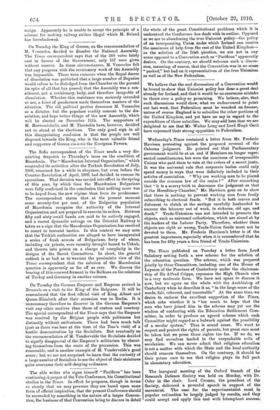The Times published on Tuesday a letter from Lord Salisbury
setting forth a new scheme for the solution of the education question. The scheme, which was prepared jointly by three Committees, including one of the House of Laymen of the Province of Canterbury under the chairman- ship of Sir Alfred Cripps, expresses the High Church view in a very moderate form. We have not space to discuss it now, but we agree on the whole with the Archbishop of Canterbury when he describes it as, "in the large sense of the words, fair, coherent, and reasonable." At the same time, we desire to endorse the excellent suggestion of the Times, which asks whether it is "too much to hope that the men who have joined him in the scheme may yet see the wisdom of conferring with the Education Settlement Com- mittee, in order to produce an agreed scheme which each Committee might regard as a bulwark against the possibility of a secular system." That is sound sense. We want to respect and protect the rights of parents, but great care must be taken lest we press those rights too far. If we do, we may find ourselves landed in the unspeakable evils of secularism. We can never admit that religious education is not a matter with which the State and the local authority should concern themselves. On the contrary, it should be their prime care to see that religion plays its full part in elementary education.














































 Previous page
Previous page